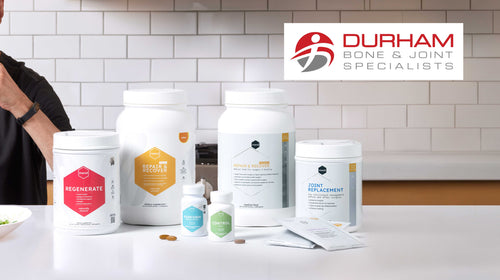In this article
Understanding what inflammation is plays an incredibly important role in your journey to a healthy life. It is involved in so many processes in our bodies. Inflammation generally gets a bad reputation, and deservedly so, as it is at the root of so many chronic illnesses. But not all inflammation is equal and some kinds are both necessary and positive.
What is Inflammation?
Inflammation is a vital part of the body’s immune response and the process by which your body’s white blood cells protect you from infection from outside invaders, such as bacteria and viruses. But in some cases, from diseases like arthritis, your immune system triggers inflammation when there are no invaders to fight off. In these “autoimmune” diseases, your immune system acts as if regular tissues are infected or somehow unusual, causing damage. Inflammation can be acute, lasting days or hours, or chronic, lasting months or even years.
What is Acute Inflammation?
Acute or short-term inflammation is the normal response to injury or illness. The inflammatory response can be brought on by things like physical injury (burns, cuts, trauma, etc), infection (bacteria, viruses, etc), or toxins, among others.
The physiological processes involved in acute inflammation include increased blood flow, greater blood vessel permeability (ability of a blood vessel wall to allow for the flow of small molecules or cells), and build-up of white blood cells, leading to redness, swelling, heat and pain at the site affected. These symptoms allow for the generation of new cells and collagen production, promoting healing of the tissue and fighting off infection.
Even acute inflammation can become problematic if it is excessive or lasts longer than a typically healthy healing response. Chronic inflammation is activated when the acute mechanisms are not sufficient in stopping an infection or clearing toxins.
What is Chronic Inflammation?
The immune system can become overactive and begin fighting harmless agents or your own body. This can lead to progression from chronic inflammation to disease. This is often referred to as “silent inflammation” and is a mortal enemy to your health.
These chronic, uncontrolled inflammatory processes unleash a host of defense responses, which ultimately disturb the normal function of cells and help prime the body for disease development. The development of a certain disease depends on the site of the response. For example, damage to intestinal cells can lead to inflammatory bowel disease. Chronic inflammation can damage your heart and brain, throw your digestive system completely out of whack, make your joints stiff and achy, and even ruin the color and texture of your skin.
It is important to note, that while the triggering factors may be different for different diseases, the general pathology linking is generally the same. In other words, if we address the source, we can fight off many inflammation related diseases.
How do you Treat Chronic Inflammation?
Several things can cause chronic inflammation, including untreated causes of acute inflammation (e.g. untreated infection), long-term exposure to irritants like chemicals, a poor diet and an autoimmune disease.
Nutrition is important in both combatting and promoting healthy inflammatory processes. In fact, it is the most important thing that we control. Avoiding things such as excessive caloric intake, and certain nutrients like saturated fatty acids (found in fatty meat and high fat dairy foods), trans fatty acids (found in fried and baked foods), and many more.
Excessive caloric intake has been shown to increase risk of diabetes and other chronic diseases, and stimulates growth and rapid increase of adipose (fat) cells. Studies have shown that decreasing caloric intake can lower bad inflammation. Most importantly, including anti-inflammatory nutrients in diet can help combat chronic inflammation. Nutrients that carry anti-inflammatory compounds are:
- Omega-3 fatty acids, as found in fish, have been shown to reduce inflammation through suppressing the production of proinflammatory cytokines (small proteins that are crucial in controlling the growth and activity of other immune system cells) [1]. Studies have shown that fish oil supplementation of 4 grams per day for six weeks resulted in reduced levels of inflammation.
- Vitamin C, found in citrus foods, helps stimulate the activity of natural killer cells generated during the immune response. A small clinical study of healthy people found supplementation with vitamin C reduced plasma levels of proinflammatory prostaglandins and CRP [2]. By reducing blood levels of inflammatory markers, inflammation in the body goes down as well.
- Vitamin E, found in plant-based oils and nuts, can aid in the scavenging of harmful free radicals and can help prevent the release of proinflammatory cytokines. A clinical study in rheumatoid arthritis found that vitamin E supplementation led to a reduction in joint stiffness and pain, which are directly related to inflammation [3].
- Polyphenols are commonly found in fruits, ventables, grains, and olive oils. Many of these have been studied for their anti-inflammatory effects. Polyphenols have been shown to help prevent formation of free radicals, and decrease proinflammatory cytokine production, all leading to lower inflammation level.
- Supplementing with nutrients like turmeric, ashwagandha, and the other micronutrients are known to aid in decreasing inflammatory markers and overall lowering chronic inflammation. This are found in Perform.
Conclusion
Inflammation serves a very important function in the acute phase of healing. However, too much or chronic inflammation is the enemy of good health and taking proactive steps to reduce “silent inflammation” will lead to improved long-term health outcomes. Modifying your diet to reduce pro-inflammatory foods and increase anti-inflammatory foods is one of the important actions you can take. Overall diets rich in the nutrients mentioned can help support a strong immune system, stave off chronic inflammation, and maintain a healthy body.
Fruits, vegetables, and healthy fats contain many of the nutrients needed to combat inflammation, but getting this long grocery list together can be taxing and don’t always have the right combination of nutrients needed. Adding Perform: Daily Inflammation to your daily diet makes this easy, as it contains anti-inflammatory nutrients like turmeric, ashwagandha, ginger root, and tart cherry that work together to manage inflammation.
When recovering from surgery or injury, your body needs more nutrients to optimally recover. Adding MEND Repair + Recover to your daily diet can help. Besides managing inflammation, MEND Repair + Recover contains key nutrients like zinc, Vitamin A and calcium to enhance bone and soft tissue healing. Additionally, MEND Repair + Recover can help you recover from intense training or strain on the body, such as a marathon, triathlon or other elite athletics.
LEARN MORE ABOUT MEND REPAIR + RECOVERSources
[1] Calder PC. n-3 polyunsaturated fatty acids, inflammation, and inflammatory diseases. Am J Clin Nutr. 2006;83(6 Suppl):1505S-1519S.
[2] Franz, M. Nutrition, Inflammation, and Disease. Today’s Dietician. Vol. 16. No. 2 P. 44. 2014.
[3] Calder PC, Albers R, Antoine J-M, et al. Inflammatory disease processes and interactions with nutrition. Br J Nutr. 2009;101 Suppl 1:S1-S45.



